
Richard Allen Boone was an American actor who starred in over 50 films and was notable for his roles in Westerns, including his starring role in the television series Have Gun – Will Travel.

Playhouse 90 is an American television anthology drama series that aired on CBS from 1956 to 1960 for a total of 133 episodes. The show was produced at CBS Television City in Los Angeles, California. Since live anthology drama series of the mid-1950s usually were hour-long shows, the title highlighted the network's intention to present something unusual: a weekly series of hour-and-a-half-long dramas rather than 60-minute plays.
The Philco Television Playhouse is an American television anthology series that was broadcast live on NBC from 1948 to 1955. Produced by Fred Coe, the series was sponsored by Philco. It was one of the most respected dramatic shows of the Golden Age of Television, winning a 1954 Peabody Award and receiving eight Emmy nominations between 1951 and 1956.
"The Comedian" is a 1957 live television drama written by Rod Serling from a novella by Ernest Lehman, directed by John Frankenheimer, and starring Mickey Rooney, Edmond O'Brien, Kim Hunter, Mel Tormé and Constance Ford.
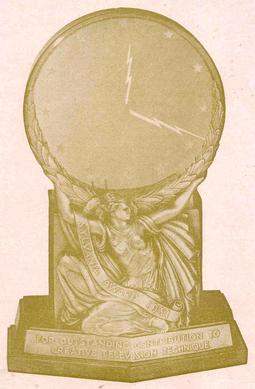
The Sylvania Awards were given by the television manufacturer Sylvania Electric Products for various categories of television performance, broadcasting, scripts, music and other aspects of production between 1951 and 1959. In their day they rivaled the Emmy Award for prestige. They came to an end after the sponsor was merged into GTE.

"Little Moon of Alban" was an American television play broadcast by NBC on March 24, 1958, as part of the television series, Hallmark Hall of Fame. It was written by James Costigan, directed by George Schaefer, and starred Julie Harris and Christopher Plummer.
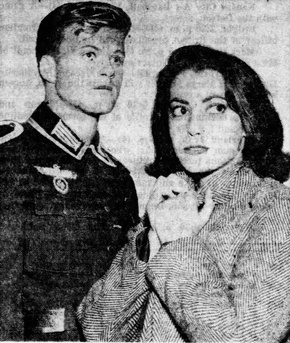
"In the Presence of Mine Enemies" was an American television play broadcast on May 18, 1960. It was the 16th episode of the fourth season of the CBS television series Playhouse 90, and also the final broadcast in the show's four-year run.

"The Plot to Kill Stalin" was an American television play broadcast on September 25, 1958, on the CBS television network. It was the first episode of the third season of the anthology television series Playhouse 90. Delbert Mann was the director, and the cast included Melvyn Douglas as Joseph Stalin, Eli Wallach as Stalin's personal secretary, and Oskar Homolka as Nikita Khrushchev. It was nominated for two Sylvania Television Awards: as the outstanding telecast of 1958 and for Douglas as outstanding actor in a television program.

"A Town Has Turned to Dust" is an American television play broadcast live on June 19, 1958, as part of the second season of the CBS television series Playhouse 90. Rod Serling wrote the teleplay, and John Frankenheimer directed. Rod Steiger and William Shatner starred.
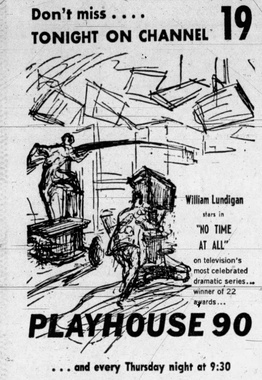
"No Time at All" was an American television film broadcast on February 13, 1958, as part of the CBS television series, Playhouse 90. It was the 23rd episode of the second season of Playhouse 90.

"Helen Morgan" is an American television play broadcast on May 16, 1957, as part of the CBS television series, Playhouse 90. It was the 33rd episode of the first season of Playhouse 90.
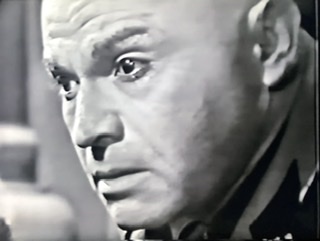
"The Killers of Mussolini" is an American television play broadcast live on June 4, 1959, as part of the CBS television series Playhouse 90. It was the 35th episode of the third season. The cast includes Nehemiah Persoff as Benito Mussolini and Harry Guardino as an Italian partisan leader.
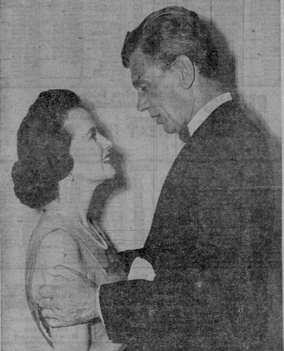
"The Edge of Innocence" was an American television film broadcast on November 7, 1957, as part of the CBS television series, Playhouse 90. It aired as the ninth episode of the second season.
The 1958 Sylvania Television Awards were presented on January 22, 1959, at the Plaza Hotel in New York City. The Sylvania Awards were established by Sylvania Electric Products.
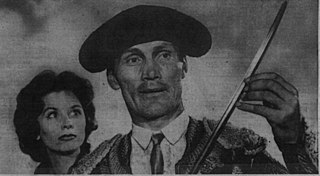
"The Death of Manolete" was an American television play broadcast live on September 12, 1957, as part of the CBS television series, Playhouse 90. It was the first episode of the second season and featured Jack Palance in the role of Manolete. Producer Martin Manulis later called it "the classic clinker of all time."
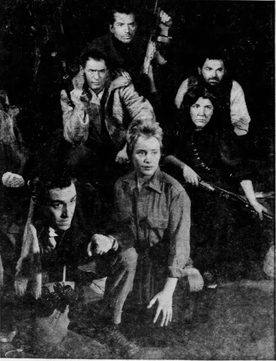
"For Whom the Bell Tolls" was an American television play broadcast in two parts on March 12 and March 19, 1959, as part of the CBS television series, Playhouse 90. It is a television adaptation of the 1940 novel by Ernest Hemingway. John Frankenheimer was the director. The cast included Jason Robards, Maria Schell, and Maureen Stapleton.

The Moon and Sixpence was an American television movie broadcast on NBC on October 30, 1959. The production, starring Laurence Olivier, was adapted by S. Lee Pogostin from the novel by Somerset Maugham. The production won multiple Emmy and Sylvania Awards, including awards for Olivier's acting, Pogostin's adaptation, and Robert Mulligan's direction.
"The Turn of the Screw" was an American television movie broadcast by NBC on October 20, 1959, as the third episode of the television series, Ford Startime. It was written by James Costigan as an adaptation of Henry James' novella of the same name. John Frankenheimer was the director and producer.

"The Bridge of San Luis Rey" was an American television play broadcast by CBS on January 21, 1958, as part of the television series, DuPont Show of the Month. It was written by Ludi Claire as an adaptation of the Thornton Wilder novel of the same name. Robert Mulligan was the director and David Susskind the producer.
"The Winslow Boy" was an American television play broadcast by CBS on November 13, 1958, as part of the television series, DuPont Show of the Month. It was based on the play by Terence Rattigan. Alex Segal was the director and David Susskind the producer. Fredric March starred as Arthur Winslow and was nominated for a Sylvania Award for his performance.














